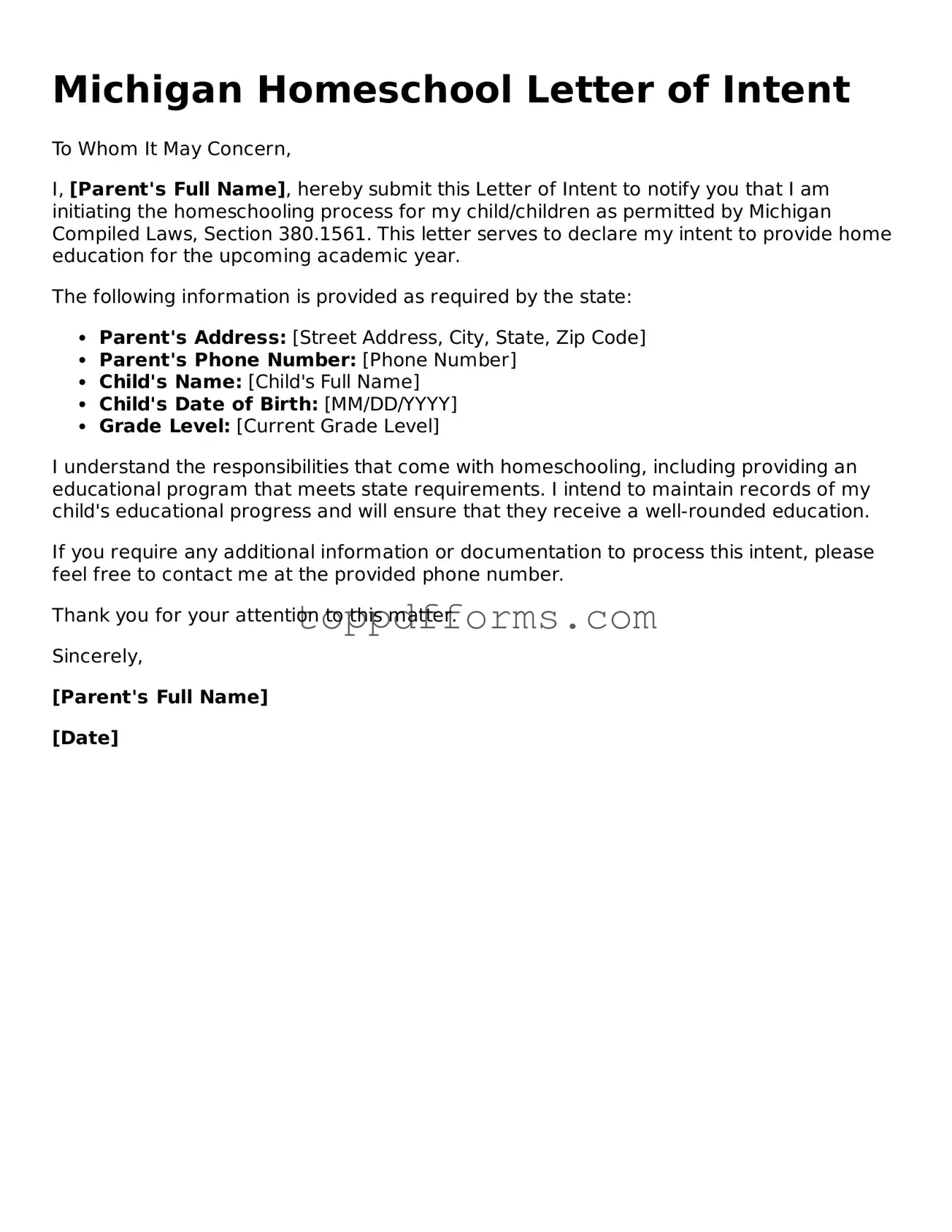Homeschool Letter of Intent Document for Michigan State
Things You Should Know About This Form
What is the Michigan Homeschool Letter of Intent form?
The Michigan Homeschool Letter of Intent form is a document that parents or guardians must submit to notify their local school district of their intention to homeschool their children. This form serves as a formal declaration that the parent or guardian will be providing educational instruction at home, rather than enrolling the child in a public or private school. By submitting this letter, families can ensure they are in compliance with Michigan's homeschooling laws.
Who needs to submit the Letter of Intent?
What information is required on the Letter of Intent?
Is there a deadline for submitting the Letter of Intent?
PDF Overview
| Fact Name | Description |
|---|---|
| Governing Law | The Michigan Homeschool Letter of Intent is governed by the Michigan Compiled Laws, specifically MCL 380.1561. |
| Purpose | This form serves as a notification to the local school district of a family's intent to homeschool their children. |
| Submission Timeline | Parents must submit the Letter of Intent within 10 days of beginning homeschooling. |
| Required Information | The form requires the names and ages of the children being homeschooled, along with the address of the homeschooling family. |
| Annual Updates | While the initial Letter of Intent is required, annual updates are not necessary unless there are changes in the homeschooling situation. |
| Local School District | The completed form should be submitted to the local school district where the family resides. |
| Record Keeping | It is recommended that families keep a copy of the submitted Letter of Intent for their records. |
Common mistakes
When parents decide to homeschool their children in Michigan, they must submit a Homeschool Letter of Intent to the appropriate school district. However, there are common mistakes that can lead to complications or delays in the process. Understanding these pitfalls can help ensure a smoother transition into homeschooling.
One frequent mistake is failing to include all required information. The form typically requires the names and ages of the children being homeschooled, along with the address of the residence. Omitting any of this essential information can result in the form being rejected or delayed.
Another common error involves not signing the form. It may seem simple, but forgetting to sign can invalidate the submission. Parents should always double-check that they have signed and dated the document before sending it off.
Some individuals mistakenly believe that they can submit the form at any time during the year. However, it is best to submit the letter at the beginning of the school year or when starting a new homeschooling program. Timing can be crucial, as districts may have specific guidelines regarding when they accept these letters.
Additionally, people often overlook the importance of keeping a copy of the submitted form. This can be vital for future reference, especially if there are questions or concerns from the school district. Having a record ensures that parents can provide proof of their intent to homeschool.
Many parents also fail to review the local school district's specific requirements before submitting the letter. While the state provides a general framework, some districts may have additional expectations or forms. Not adhering to these can lead to unnecessary complications.
Another mistake involves neglecting to inform the district of any changes in the homeschooling situation. If a family moves or if there are changes in the children being homeschooled, it is important to notify the district promptly to avoid any potential issues.
Some individuals misunderstand the implications of the letter. The Homeschool Letter of Intent does not grant permission to homeschool; rather, it serves as a notification to the school district. This misconception can lead to confusion about the legal standing of the homeschooling arrangement.
Moreover, not keeping up with updates in homeschooling laws can be detrimental. Laws and regulations can change, and staying informed is essential for compliance. Parents should regularly check for any updates that might affect their homeschooling status.
Lastly, a common oversight is not reaching out for help or clarification when needed. Many resources are available for homeschooling families, including local support groups and online communities. Utilizing these resources can provide guidance and help prevent mistakes.
By being aware of these common errors, parents can navigate the process of submitting the Michigan Homeschool Letter of Intent more effectively. Attention to detail and proactive communication with the school district can lead to a successful homeschooling experience.
Other Common State-specific Homeschool Letter of Intent Forms
Letter of Intent to Homeschool Template - Help foster a better understanding of homeschooling within your community with this letter.
The Texas Motor Vehicle Power of Attorney form is an important legal tool that empowers someone to manage motor vehicle transactions on behalf of another person, especially useful for those who cannot attend to such matters directly. To simplify the process of obtaining this document, you can download the necessary templates from PDF Templates.
Free Homeschool Programs Illinois - The Homeschool Letter of Intent expresses your decision to provide education at home rather than in a traditional school setting.
Homeschool Affidavit Pa - Providing detailed information can strengthen the homeschool framework.
How to Home School in California - Submitting a Letter of Intent can provide reassurance to families that they are adhering to legal requirements while embarking on their educational journey.
